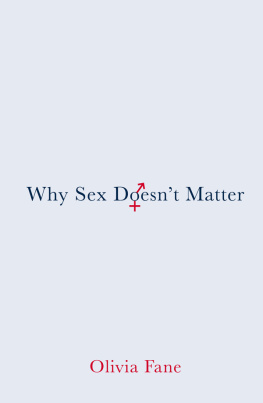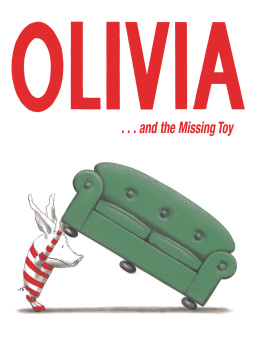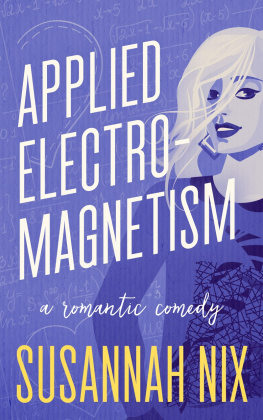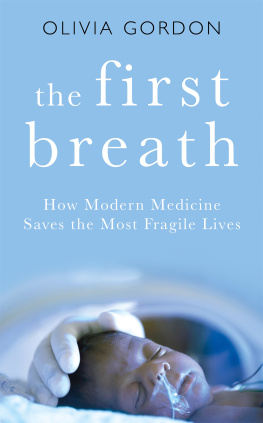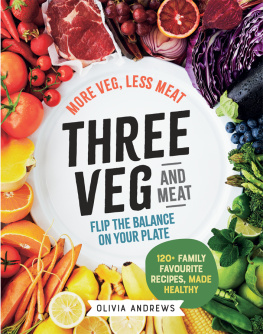
WHY SEX DOESNT MATTER
WHY SEX
DOESNT MATTER
By
OLIVIA FANE

Mensch Publishing
51 Northchurch Road, London N1 4EE, United Kingdom
First published in Great Britain 2020
Copyright Olivia Fane, 2020
Olivia Fane has asserted her right under the Copyright, Designs and Patents Act, 1988, to be identified as Author of this work
All rights reserved. No part of this publication may be reproduced or transmitted in any form or by any means, electronic or mechanical, including photocopying, recording, or any information storage or retrieval system, without prior permission in writing from the publishers
Every effort has been made to contact the copyright holder to request permission to use quotations and extracts. If notified, the publisher will be pleased to rectify any errors or omissions at the earliest opportunity
A catalogue record for this book is available from the British Library
ISBN: HB: 978-1-912914-08-1; eBook: 978-1-912914-09-8
Typeset by Newgen KnowledgeWorks Pvt. Ltd., Chennai, India
For my dog, Hector, who first gave me the idea for this book
CONTENTS
There have to be personal reasons to set aside a couple of years to research a book about sex. As a young child, perhaps about nine years old, I found a discarded Playboy magazine tucked away in a shrub at the golf club where my parents used to play. I looked at this naked, big-breasted blonde, her legs splayed apart, her vacant eyes, mouth half open, hand delving deep into her bush. That was when I first learnt about my adult role in life, and I felt sick to the heart.
I had heard the phrase adult entertainment bandied about before, but somehow always imagined it meant sporting news and mortgage advice. When I confronted my mother about these things, she tried to put my mind at rest, assuring me that when the hormones came Id actually want to spread my legs and put that silly face on. But when the hormones did come at the age of thirteen, and I began waiting in alarm for some meteoric change in the way I viewed the world, nothing happened. I felt a surge of pride and relief that I was still a rational being, yet there was a simultaneous anxiety that the animal wouldnt kick in at all, that there was something wrong with me, that I would have to spend the whole of my life pretending in order to fit in socially.
While one society might call a woman a whore and even stone her to death for premarital sex, our own works by labelling us frigid and prudish if we dont submit to more or less anything and take pleasure in it, too. Ive lived my life in this second society, and done my best to fit in, to conform. Societal pressure is one hell of a weight; sex is natural, whats wrong with you? one hell of an argument. Im writing this book to argue back. Im a sex sceptic. This book is an unapologetic debunk.
Sex as we know it today was only properly born in the twentieth century, when the advances of medical science made it possible to have sex without fear of pregnancy or syphilis. Yet weve somehow managed to persuade ourselves that this odd activity we so enjoy is profound, spiritual, communicative and above all important . We bandy the word repression as though putting the brakes on any weird and wonderful sex act is going to send us spiralling into mental illness. We tell each other that trying to resist our darkest impulses, wherever they lead us, just isnt good for us.
In this book, I argue that these are the stories we have told ourselves, and that theyre the wrong stories. We hungrily scan the Bible for the Good News that Jesus Christ thought sex as deep and meaningful as we like to imagine it is, but he doesnt even mention it, just a few random thoughts about adulterers. Jane Austen scholars have long harboured the hope that missing lines in letters to her sister Cassandra would reveal intimate details of her sexuality or the existence of a love child, but the six lines recently unearthed turned out to be no more salacious than an inventory of household linen. Surely Shakespeare can tell us a thing or two: a good deal of bawdy humour, and something darker, perhaps. Nothing more. Any era, any culture we care to look at might be more or less permissive; but only modern Western culture gives sex this undue reverence.
We say that sex is loving and beautiful and all manner of things persuasive words, doubtless, which make us feel better about ourselves. Sex has been packaged as to do with connection and communication, but its difficult to pin down how and when this happens. What lover would dare say the truth, that theyve actually got no idea whats going on in the head of their partner? And does anybody really believe that if a couple are communicating well in real life, vis--vis household chores, the sex is just going to be completely thrilling? Because it wont be. Its the lure of the transgressive which is essentially sexy, thats where its epicentre lies, doing things which are out of bounds in everyday life. If sex was not taboo, said Freud, it would be banal. The naughtier the better: therein lies its siren song.
Those who revere sex might talk of a raw honesty between the lovers, yet its hard to think of a more dishonest activity. To begin with, theres the adoption of a sexual persona. Both lovers have to make themselves as beautiful as they possibly can, because whether your body and face are fit is a core value of sex. Young women regularly submit to surgery to make themselves look like dolls, with sexy baby-faces. Forty-five per cent would like to buy themselves, if only they could afford it, the off-the-peg Love Island facelift advertised on the front of Cosmopolitan this summer. Both men and women must make sure their bodies are toned, honed, pruned and bronzed.
Equally, you have to pretend you have no inner life at all. No, you do not tell your potential lover about the death of a parent, or your anxieties about your daughter who is refusing to go to school. You pretend that qua woman and qua man you are perfect and uncomplicated, and a pleasant relief from the previous partners, who were getting rather suspiciously like real people and had to be ditched because the sex was losing its power.
There is no opening up of one heart to another; in fact, theres no real communication going on at all, over and above, if you put your finger/tongue there, that feels great. In the act of heterosexual sex a man and a woman are at their most gendered and at their most separate. If the clich is right, that women are more emotional about sex while men are more intent on physical pleasure, then they are singing from different hymn sheets. And the pressure to please is exhausting for both parties: the man insisting that the sex for him is an act of love (thinking thats what she wants to hear) and the woman insisting that the pleasure shes experiencing is mind-blowing (thinking thats what he wants to hear).
During the act of sex, one third of women fake orgasm. We hear this statistic bandied about in the media all the time, and I think of the advice of my dear mother who has followed me in many of the chapters of this book, If you dont have an orgasm, darling, you must always pretend, because men so love it when they feel theyve given you pleasure. Yet the very word fake suggests its the women who have somehow failed yet again, that horrid word frigidity looming above every woman like a curse.
The purpose of sex, unless you are a prostitute, is pleasure. Yet pleasure strikes me as such an odd ambition. Pleasure is surely a shallow aim, however compulsive we are in its pursuit. Contrast it with motives for other activities we humans might commit to: cooking a hot meal for a someone just out of hospital, being up all night with your sick child, running a holiday camp for disabled young people. Yet for some strange reason, we have decided that when the pleasure is related to sex it zooms right up there to very important . What does it say about we modern people that we have to be in a state of being permanently thrilled?
Next page
